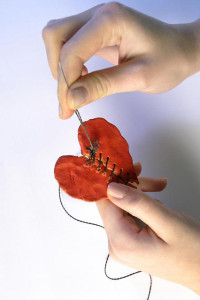Women and grief recovery

Mending grief (Image Source)
What do women do when hardship/tragedy happens? We connect. Of course we may isolate and get depressed, but usually, as women, we have the advantage of being more open to accessing our feelings and talking to others about our sorrow and fear.
We do this with friends, family members, other women, and partners. And now we are doing it online! I recently ran across a blog site called blogher.com. The page I was drawn to is titled “Women moving through grief, inspiring as they go”. There, Mata H. describes the grief and loss she sees all around—saying that it’s hard to find anyone (especially in their 50’s) who hasn’t been dealing with something really difficult directly or indirectly, say, the loss of a child, elderly ill parents, a friend or family member dealing with cancer. We are all subject to challenges and problems going on in the world around us, and no one is immune, from children to octogenarians. Even in “good times” when there is less stress, we must all cope with the uncertainty of life’s ups and downs, such as the threat of war, financial crisis, global warming, and disease.
Grief or bereavement is a natural part of the process of recovering from loss, whether it be a tangible loss, like death, or a less tangible loss, like loss of trust or faith in someone or something. Traumatic experiences bring complex grief, because there is a general loss of security and safety at the time of the trauma.
It is better to feel grief than to shut down and push those feelings away. And, this may need to happen very slowly and carefully depending on the depth of the loss. Everyone has their own way of grieving even though there are stages of grief you may have heard about–denial, , bargaining, depression, acceptance. Bereavement can resemble clinical depression with low mood, tearfulness, difficulty sleeping, loneliness, loss of appetite, and irritability as possible symptoms. If you have been traumatized in the past, then grief can be a double-whammy–because there is the previous loss and also the current loss to cope with. Because the overlap between grief and depression is common, you might decide to get some grief counseling to determine if your situation warrants help in the form of therapy or medication.
There is no real right or wrong way for grief recovery to happen. However, connecting with others in any manner, whether it is live or online, is a good idea, as long as there is caring and support in the connection. For those of you who are lucky enough to have good friends and relatives who are there for you, you know what I mean. And if you are struggling to find support, please consider taking the risk to reach out.


Comments
Women and grief recovery — No Comments
HTML tags allowed in your comment: <a href="" title=""> <abbr title=""> <acronym title=""> <b> <blockquote cite=""> <cite> <code> <del datetime=""> <em> <i> <q cite=""> <s> <strike> <strong>